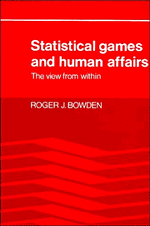Book contents
- Frontmatter
- Contents
- Preface
- 1 The reactive sample space
- 2 Response and social information
- 3 Response and strategic behavior
- 4 Publication and the political economy of prediction
- 5 Rational expectations and socioeconomic modeling
- 6 Games, beauty contests, and equilibrium: the foundations of structural invariance
- 7 Disequilibrium and noncooperative expectational games
- 8 The view from within
- References
- Index
6 - Games, beauty contests, and equilibrium: the foundations of structural invariance
Published online by Cambridge University Press: 05 February 2012
- Frontmatter
- Contents
- Preface
- 1 The reactive sample space
- 2 Response and social information
- 3 Response and strategic behavior
- 4 Publication and the political economy of prediction
- 5 Rational expectations and socioeconomic modeling
- 6 Games, beauty contests, and equilibrium: the foundations of structural invariance
- 7 Disequilibrium and noncooperative expectational games
- 8 The view from within
- References
- Index
Summary
Introduction
In the previous chapter we described the idea of a rational-expectations equilibrium. The reader will recall that such an equilibrium is characterized by equality between the subjective expectations of participants and mathematical expectations given their respective information sets. All predictions are in this sense self-fulfilling. One might suspect from the anticipatory nature of such systems that some problems might arise for the theory of social or economic policy. This does turn out to be the case, and the early part of this chapter is concerned with the resulting problems. To begin with, a degree of care must be exercised that policy rules are based on the real invariants of the system and not upon the kind of reduced form that is usually taken to govern the system's evolution. Moreover an anticipatory system implies a fair measure of interdependence between the action of the policymaker and the actions that he or she is trying to influence, introducing the possibility of game-theoretic interactions between policymaker and subjects. The additional complexity of the resulting control problems together with the necessity of identifying those parameters that remain invariant under different controls impose an estimation task of considerable magnitude for the policymaker. All the preceding issues are discussed in Sections 6.2 and 6.3. Even if these problems can all be satisfactorily resolved, an additional difficulty arises for the application of standard control-theoretic methods: the problem of time inconsistency, discussed in Section 6.4.
- Type
- Chapter
- Information
- Statistical Games and Human AffairsThis View from Within, pp. 187 - 216Publisher: Cambridge University PressPrint publication year: 1989



